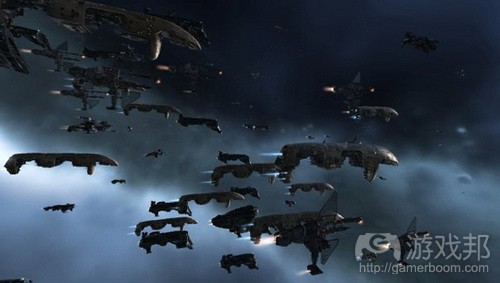分析CCP玩家代表委员会CSM的运作模式
作者:Alexander Gianturco
CCP在《EVE Online Incarna》推出扩充内容后逐步走向没落——这导致亚特兰大工作室急剧收缩,给即将问世《World of Darkness MMO》蒙上阴影,公司裁员20%(游戏邦注:公司共有员工600人),但这一状况因最近刚发行的《Crucible》扩充内容而有所好转。在疏远公司核心作品,放弃订阅游戏内容,目睹公司系列错误商业决策(这给公司的虚拟交易业务带来不少麻烦)2年后,《EVE》玩家似乎开始接受公司的失误。
置身CCP同玩家有关《EVE》命运这场斗争前线的是Council of Stellar Management(CSM),这是民主选举的玩家代表委员会,他们在公司的游戏开发过程中扮演着利益关系人的角色。这个团体有时充当宣传媒介,有时则是起到直接抵制CCP商业计划的作用。
在联系开发者方面,CCP赋予CSM特殊权利;CSM 1年会飞往公司冰岛总部若干次,参加为期数天的繁琐会议。但游戏出现危机时,如2010年的“Summer of Rage”或是最近的Monoclegate事件(玩家因公司引入虚拟商品而发起抗议),CCP都会召集CSM,极力进行调解。
起初有人称这是公司在制造公关噱头,但CSM自2008年成立来已逐步发展成强大的发言组织。多数时候,CSM都是扮演审查者的角色,辅助CCP的中级开发者试验游戏设计构思;“EVE”是非常复杂的宇宙世界,因此游戏设计师不可能亲身体验游戏的各个方面。
但在其他时候,CSM更多是给CCP管理人员施加外部压力,特别是当他们做出违背玩家和游戏设计师预期的决策时,从而让游戏领域和玩家群体建立起良好的关系网,令玩家得以表达自己的看法。
因此从商业角度看,CSM计划对CCP来说是把双刃剑。一方面,CSM提高游戏质量及玩家体验状况——因此也就给CCP带来更多收益。而另一方面,玩家代表团体不受开发者控制,会对玩家的不满情绪采取具体措施,这会影响到公司的收益情况。赋予小小民主权利也是件危险的事情。
总的来说,CSM计划始终更多着眼于CCP的收益情况。在推出前,CSM非常不满《Tyrannis》和《Incarna》扩充内容,二者都是陈旧内容,会危及公司生存。而《Crucible》扩充内容则是CSM就《EVE》核心玩法做出系列调整后的最终产物,原先心存不满的玩家又开始纷纷重新订阅内容。藐视民主权利的后果非常危险,但若你尊重它们,你将从中收获良多。
有些玩家提议在其他MMO游戏中也创建类似组织,例如不幸的《Star Wars Galaxies》银河参议院。但只有CCP赋予玩家社区定期同开发者直接会面的机会,将团体视作玩家的真正代表。
现在CSM已逐步发展成熟,我们必须思考:创建MMO用户组织的优点是什么?其他MMO游戏要如何设立类似组织?
反馈困境:为什么要创建用户组织?
现代MMO游戏相当复杂,他们的用户会在其中创建虚拟社会。社区具有一定规模及游戏设计师任务艰巨意味着,他们无法深入把握游戏玩家的体验风格。
这在包含大型游戏世界(游戏邦注:足以支撑多元社区的游戏世界)的MMO游戏中更是如此,例如《魔兽世界》、《Rift》、《EVE》和《Second Life》等;玩法集中的大型在线游戏不会呈现此类复杂元素:需要融入超越开发者个人经历的广泛玩家反馈信息。
有些玩家通过论坛提供反馈信息,但MMO论坛就是个重灾区;匿名沟通意味着论坛上的玩法变更反馈信息会略带有歇斯底里情绪,包含最后通牒的意味。
从论坛上获得反馈信息非常麻烦。更重要的是,论坛只能充当反馈玩法变更的渠道,而这些变更通常在开发后期出现,它们或已落实到游戏中,或已出现在公共测试服务器上。它们无法充当早期预警机制,将糟糕构思扼杀于摇篮中。
相反,玩家委员会提供更可靠的反馈信息,因为它们会在论坛之外同开发者碰面。当面沟通要比通过文本更有效率,它让玩家得以查看他人的肢体语言;去除论坛最后通牒的歇斯底里元素。
用户支撑组织还能够提供有关论坛争辩话题的建议,排除那些相比重要的持久问题显得有些微不足道的意见。
也许最重要的是,玩家组织会遵守NDA(保密协议),这意味着他们可能提供基于原有认识的反馈意见。若开发者获得的反馈信息不是基于NDA原则,那么开发资源早就淹没其中;完全一去不复返。玩家支撑组织弥足珍贵,能够提醒设计师对项目做出调整或完全放弃项目。
用户委员会能够促使玩家形成友善情绪,若开发者将玩家反馈信息纳入考虑中;这说明公司有对玩家的意见给予重视。支撑组织还向公司提供正式沟通渠道。开发公司不是一味发表陈腔滥调,相反他们能够同由用户代表构成权威组织进行沟通。
用户组织能够在公司遭受争议时帮其解围;若公司表示自己有就某个颇有争议的变更咨询委员会,且他们同意做出此改变,那么委员会就会帮公司分担些许责任。不满最终决策的玩家会责怪自己的代表,而不是公司。
我们发现这在《EVE》的第五代CSM组织中得到印证,他们赞同许多玩家强烈反对的变更:移除跳跃桥梁。随后CSM5代表在下次选举中全被剔除,这说明玩家并没有责怪这些不得人心的变更。
同样,当玩家在《Incarna》发行后发生骚动时,CCP将CSM召集至雷克雅维克探讨此危机形势,公司发布消息称CCP不会采用“付费获胜”虚拟交易模式,且CSM证实CCP的声明,这要比单方面新闻发布更可靠。
从商业角度来看,创建玩家代表组织并不需要耗费很多资金(游戏邦注:要比普通的广告活动便宜很多)。玩家代表经常扮演志愿者角色,每天投入几小时配合组织成员及开发者,旨在提高游戏质量。最终的回馈相当可观,不仅体现在在PR和用户留存率,而且还能够有效防止出现糟糕商业决策。
用户民主机制:基于CSM积累的经验
CCP计划至2008年出现以来获得显著发展,若有开发者想要效仿这一机制,有很多关于创建和管理高效用户支撑组织的实际经验可供参考。
首先,挑选若干代表和替补人员。《EVE》CSM有9个代表和5个替补人员。代表亲自参加开发者首脑会议,替补人员则顶替其他没法到位的人员。但确保让替补人员尽可能多地参与其中,因为他们通常代表在社区中占据重要位置的少数人。
虽然效仿CCP挑选14个代表没什么必要,但挑选充足代表人员,以有效避开古怪的候选人员是个明智之举。每个选举过程,无论是真实,还是虚拟形式,都会招来几个古怪之人;这点我们要有心理准备,通过挑选出众多玩家代表,这些古怪之人将日益显现出来,最终被逐出局外,且不会破坏整个进行过程。
很多候选者都可能变成最终候选人。在有些CSM选举中,甚至出现50多位最终候选玩家的情况。
有关调整CSM下个选举周期,最常谈及的话题是,执行最低签名标准,例如候选者在被列为候选名单前需获得一定数量的支持——就和现实的选举一样。若候选名单有50多位候选者,操作起来将有些混乱,会浪费很多选票,这会损及委员会的合法性。
接受最初的低选票,然后积极通过在登陆页面及论坛上宣传选举和委员会提高支持率。很多玩家都会对用户委员会持怀疑态度,直到其创造有形的成果;怀疑委员会不过是一群PR骗子的负面观点需靠实际行动予以反驳。合法地位需靠认同委员会在执行玩法变更时所做的贡献建立起来。若操作顺利,支持率就会迅速提高,玩家代表的选举就会变成一个高风险的战场。
任期应该维持1年。6个月太短;CCP起初给CSM设定6个月期限,这很快就带来选举疲劳,还有就是给委员会带来更多变动。代表通常在任期前3-4个月才渐渐把握伙伴如何同开发者展开沟通。
让委员会建立起系统知识及允许优秀代表连任非常重要,所以任期限制非常不明智。早期CSM除规定任期6个月外,还设定任职限制,2年里几乎所有杰出候选者都已任过职(游戏邦注:候选者的选择性越来越小)。随后任期限制被废止,CSM的质量迅速得到恢复。
第一代CSM有点像玩家代表大会。当时委员会有设立“Assembly Hall”论坛,方便玩家提出建议,就像法律草案。随后CSM将就这些问题进行表决,给CCP最终决定提供建议。
这是个错误之举。游戏设计不是民主决策过程,Assembly Hall让玩家觉得,“通过”的问题就会得到执行;若未能得到落实,那么CSM就是个骗子。后来的CSM都纷纷放弃使用Assembly Hall,转而瞄准支撑组织——这是个游说团体,而不是代表大会。
建立好组织后,将委员会置于NDA之下,及让其同真正的游戏开发者沟通非常重要。CCP首次创建CSM时,组织成员多数时候是和高层管理人员沟通,这些人员几乎不会影响到玩家关心的游戏细节。
CSM设有针对代表和替补人员的论坛,方便他们同开发人员讨论问题,雇员应积极从委员会那获得反馈信息。除论坛和直接碰面外,现代CSM还有同重要开发者沟通的直接聊天渠道——Skype,旨在获得即时反馈及进行更好交流。
开发者应积极通过玩家委员会获得反馈信息,而不应忽略他们。多年来,CSM反复提醒CCP放弃其核心产品的危害性;若玩家代表遭到忽视,玩家将因此而心生不满。若你打算创建用户委员会,我们的建议是,要仔细对待组织,避免遭遇用户反击。玩家组织能够有效防止公司做出后悔莫及的决策。(本文为游戏邦/gamerboom.com编译,拒绝任何不保留版权的转载,如需转载请联系:游戏邦)
Giving Your Players a Voice: Lessons from EVE Online
by Alexander Gianturco
[EVE Online's Council of Stellar Management is a body elected by the players of the game to interface with the developers and help drive the direction of the MMO's development in directions that appeal to the player base. What are the opportunities and dangers of having such a body? CSM chairman Alexander "The Mittani" Gianturco explains.]
CCP’s spectacular fall from grace in the aftermath of the EVE Online Incarna expansion — which resulted in drastic cuts to its Atlanta office, threw a cloud over its upcoming World of Darkness MMO, and saw 20 percent of the 600-employee company’s staff laid off — may be redeemed by the recent Crucible expansion. After two years of drift away from the core product, stagnating subscriptions, and a series of ham-handed business decisions that sparked riots in its virtual world, the EVE player base appears to be accepting the company’s mea culpa.
On the front line in the battle between CCP and its customers over the fate of EVE is the Council of Stellar Management (CSM), a democratically-elected group of player representatives who have been granted stakeholder status in the company’s development process. This body, at times, acts as a sounding board, an advocacy group, or in direct opposition to CCP’s business plans.ma
CCP has granted the CSM extraordinary power in terms of the access it has to the developers; several times a year the CSM is flown to the company headquarters in Iceland for days of arduous meetings. When a crisis within the game erupts, such as in 2010′s “Summer of Rage” or the recent Monoclegate, in which players revolted when the company introduced virtual items, CCP calls in the CSM to attempt to mediate.
Initially written off by some as a PR stunt, the CSM has developed since its introduction in 2008 into a powerful advocate. Mostly the CSM functions as a sanity check for mid-level developers within CCP to bounce game design ideas off of; since EVE is such a complex universe, it’s impossible for every game designer to have personal experience with every aspect of the game.
At other times, however, the CSM has been an outside source of pressure against CCP’s management when it makes decisions which overrule the desires of their customers and the game designers, marshaling an impressive nexus of contacts in the gaming media and the player base to get that point across.
Because of that, the CSM project seems like a double-edged sword for CCP from a business perspective. At one level, the CSM has improved the quality of the game and the lives of the players — and thus CCP’s bottom line. On another level, it has shown that a player advocacy group will not be co-opted by the sponsoring developer, and can focus player dissatisfaction into concrete action that can impact the company’s balance sheet. A little democracy is a dangerous thing.
Yet, on the whole, the CSM project has been on the side of CCP’s bottom line since the beginning. The CSM was vehemently critical of the Tyrannis and Incarna expansions before their releases, both of which were duds — duds which came to threaten the company’s survival. The Crucible expansion, on the other hand, is a laundry list of CSM-sponsored changes to the core gameplay of EVE, and the disaffected customer base has responded by re-subscribing in droves. Democracy can be dangerous if you defy it, but profitable if obeyed.
There have been player advocate organizations in other MMOs, such as the ill-fated Galactic Senate of Star Wars Galaxies. Yet only CCP has empowered its player council with direct and regular access to the developers, treating the group as actual representatives of the players.
Now that the CSM has matured — and may have helped save EVE Online from the irrational exuberance of CCP’s upper management — we must ask: what are the advantages of setting up a player council for a MMO, and how could other MMOs set up similar bodies?
The Feedback Dilemma: Why Have a Player Council at All?
Modern MMOs are complex, sprawling entities, and their customers create virtual societies within them. Their sheer size, and the demands of a game designer’s job, mean that it is impossible for a developer to achieve an in-depth understanding of the play styles of a game’s customers.
This is particularly the case for MMOs that feature worlds large enough to support diverse societies, such as World of Warcraft, Rift, EVE, Second Life, etc; massively online games with a narrow gameplay focus such as World of Tanks don’t present the kind of complexity that would necessitate extensive additional player feedback beyond a developer’s personal experiences.
Some have relied on forums to provide feedback, but MMO forums could be politely referred to as a disaster area; the nature of anonymous communication means that feedback on gameplay changes on forums is tinged with raw hysteria and seasoned with ultimatums.
Even at its best, attempting to get feedback from the forums is like drinking from a firehose. More significantly, forums can only be used as a feedback method for gameplay changes that are far along the development pipeline, either already implemented in the game itself or on a public test server. They cannot serve as an early-warning system against bad ideas in their infancy.
By contrast, a player council offers more credible feedback, as it meets with the developers outside of a forum context. Communication in person is far more effective than text, as it allows people to read one another’s body language; this removes the hysteria of forum ultimatums.
Advocacy groups also can offer advice about forum controversies, distinguishing those that will blow over from actual lasting problems that the developer needs to address.
Perhaps most importantly, player councils can be covered by a NDA, meaning that they can provide player feedback on early-concept ideas. If a developer gets an idea to the stage of it being shown in a non-NDA context, the development resources have already been sunk; there is no turning back. Player advocacy groups are the canary in the mineshaft to warn designers that their future project needs to be changed or abandoned entirely.
A player council provides a boost to customer goodwill, assuming the feedback of the group is actually taken into consideration; it shows that the company is taking the view of the players into account. Advocacy groups also provide the company with a formal interlocutor. Rather than only being able to offer platitudes — “We listen to our customers!” — the company can demonstrate that it is in communication with a sanctioned group of elected player representatives.
This can take significant heat off the company when controversies erupt; when the company can say that it consulted with the player council about a controversial change and that the council approved, the council shoulders some of the responsibility along with the company. Players who disagree with the decision will blame their representatives rather than the company itself.
We saw this demonstrated in EVE with the fifth CSM, which hand-waved a change that many players vehemently disagreed with: the removal of jump bridges. The CSM5 representatives were then tossed out of office at the next election. CCP, which originally suggested these unpopular changes, was not blamed.
Similarly, when the player base rioted after the Incarna release and CCP called the CSM to Reykjavik to discuss the crisis, the company message that CCP would not be implementing “pay to win” microtransactions was more credible than it would have been had it issued only a one-sided press release: the CSM was able to corroborate CCP’s statement.
From a business perspective, having a player representative group is inexpensive, costing far less than even a moderate advertising campaign. The player representatives often function as unpaid volunteers, spending several hours each day working both with their constituents and the developers to improve the game. The bottom line benefits are significant, not just in PR and customer retention, but as a prophylactic against bad business decisions.
The Mechanics of Player Democracy: Lessons from the CSM
The CCP experiment has evolved considerably from its initial introduction in 2008, and should another developer wish to imitate this system there are a number of lessons learned about the practical process of setting up and managing an effective player advocacy group.
First, pick a number of representatives and backup/alternate candidates. The EVE CSM has nine delegates and five alternates. The delegates attend the in-person summit meetings with the developers and the alternates fill in for those who can’t make it. However, the alternates should be included as much as possible in the process as they tend to represent minor but important constituencies in the player base.
While imitating CCP’s choice of 14 representatives isn’t necessary, it is wise to choose a sufficiently large number of representatives to avoid the risk of oddball candidates. Every election, real or virtual, vomits forth a couple of nutters; this is to be expected, and with a large enough body of representatives they can be identified and sidelined without disrupting the whole process.
Many candidates can be expected to try to get on the ballot. Some CSM elections see more that 50 players running for a spot.
One of the most-discussed ideas for tweaking the CSM for the next election cycle is to implement a minimum signatures requirement, such that an aspiring candidate must show at least a modicum of support before being added to the ballot — just like in a real world election. A ballot with over 50 candidates is confusing and wastes a tremendous number of votes, which harms the legitimacy of the council.
Accept an initially low turnout, but fight against it by advertising the elections and the council on login screens and the forums. Many players will be skeptical of a player council until it produces tangible results; the suspicion that the council is just a bunch of PR shills must be refuted by action. Legitimacy must be established by giving credit and acknowledging the involvement and contributions of the council when gameplay changes are implemented. If this is done well, turnout will spike and the election of player representatives will become a high-stakes battlefield.
Terms should last for a year. Six months is too short; CCP began the CSM with six month terms, and it rapidly created election fatigue, in addition to too much churn on the council. Representatives were only just getting a sense of how the company and its developers worked within the first three to four months of their terms.
It’s also important to have an institutional memory on the council and allow the best representatives to remain on the body, so term limits are unwise. The early CSM had term limits in addition to six month terms, and ran through most of the talented candidates in two years. The term limits were abandoned, and the quality of the CSM recovered.
The first iteration of the CSM was set up like a player congress. A forum called the “Assembly Hall” was created for any player to create proposals, like a legislative bill. The CSM could then take up and vote on these issues, giving rise to an implication that these issues would be acted on by CCP.
This turned out to be a mistake. Game design isn’t a democratic process, and the Assembly Hall gave rise to an expectation in the player base that “passed” issues would be acted on; when they weren’t, the CSM itself was seen as a sham. Later iterations of the CSM have essentially abandoned the Assembly Hall, focusing instead on advocacy — a lobbying group for the players, rather than a congress.
Once established, it’s important to put the council under NDA and to also put it in contact with the developers who actually produce the game. When CCP first established the CSM, members were mostly put in contact with only high-level management, which had little impact on the nuts and bolts that concern customers.
The CSM has a private forum for the delegates and alternates to discuss issues with the developers, and employees should be encouraged to seek feedback from the council. In addition to a forum and in-person summits, the modern CSM has a real-time chat channel with key developers using Skype, allowing for immediate feedback and better communication.
A player council should be used for feedback and not ignored. As the canary in the mineshaft, the CSM warned CCP repeatedly over a period of years about the dangers of abandoning its core product; when player representatives were ignored, this only increased the outrage of the customers. If you go through the effort of establishing a player council, its advice should be taken seriously, lest there be blowback from the players. A player council can be the first line of defense against the kind of corporate groupthink that drives game companies to ruin.(Source:gamasutra)










































 闽公网安备35020302001549号
闽公网安备35020302001549号